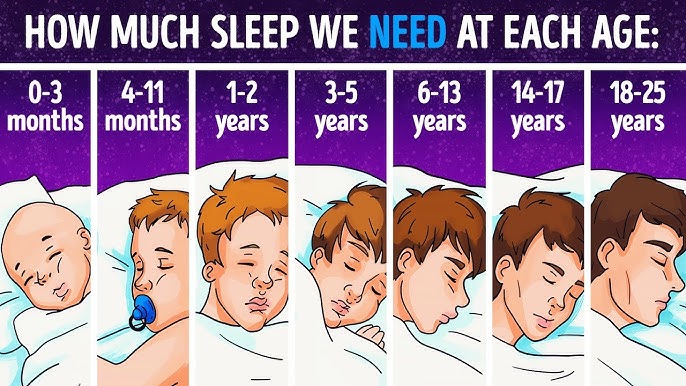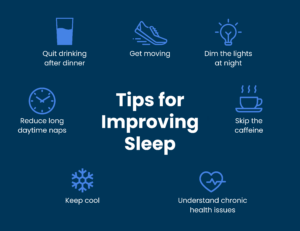Sleep is essential for maintaining one’s physical and mental health as the troubles of life can be washed away and an energetic mind and body can be approached. However, the required amount of sleep may differ from person to person given their level of activity, age, as well as, health. Adults are recommended to sleep for 7 to 9 hours and children and teenagers on the other hand need to sleep more because of the sleep-deprived stages of consistent growth they go through. What is recommended based on the age is how much sleep should be aimed for. Eagerly, It would also be helpful to assess and understand how sleep affects physical and mental health when changing over the course of development. Given in the form of a graph, the lower section of the text provides a detailed breakdown on possible hours of sleep based on the duration.
Newborns (0-3 Months): 14-17 Hours
The average number of hours a newborn sleeps is 14 to 17 hours, although it should be noted that, this too is not uninterrupted. Considering the fact that Age from 0 to just 3 months is this stage where significant growth should be expected, structurally sleep cycles are relatively shorter for them as they do wake up often to eat. As a result, at their respective ages babies have not yet developed or refined their sleep patterns so for the time being they take a series of short naps and a few longer ones scattered through the 24 hour cycle. Such amounts of sleep are significant, especially for brain development and physical growth in such early stages of life where short but frequent periods of sleep are common.
Infants (4-11 months): 12-15 Hours
Unfortunately for all you new mothers and fathers out there, as your infant begins to grow, their sleep duration may start to reduce steadily, but they do still require twelve to fifteen hours of sleep each day, at this point in their lives they however begin to grow out of the habit of long supervised naps always accompanied by some short night sleep which equates to around 2-3 short naps each day, this growth change is very much appreciated by parents since their infants start sleeping for longer hours during the night and tend to do so more frequently putting the growing baby in a more routine living. This sort of rest is critical to their physical growth, as well their emotional state and cognitive development.
Toddlers (1-2 years): 11-14 Hours
When your child becomes a toddler they get a little impatient during nap times and other such activities owing to the fact that they are slightly older and have more developed motor reflexes, therefore they require eleven to fourteen hours of sleep which begins with bedtime sleep and contains one or two afternoon naps. It is safe to assume that sleep at this age plays a fundamental role since their average daily activities include physical exertion aimed at improving their gross motor skills while at the same time balance motor stability through activities spread throughout the day. It is worth mentioning that with the child aging their brain becomes more active even at this stage needing sleep to assist with the retention of memories as well as their comprehension in the future, this sleepless and restless time usually goes hand in hand with growing teeth which makes their time spent sleeping aid in growth as a teenager.
Preschoolers (3-5 years): 10-13 Hours
In general children in the age bracket of 3-5 year are supposed to have approximately 10-13 hours sleep in a day. Most children in this age group do not engage in naps and while some do take an afternoon rest, it is not advisable. Nap, again, is not recommended as one should indeed get enough sleep at night. Children, who are very active during the day, require good sleep to ensure their emotional regulation, growth and optimum cognitive functions. Increased grappling with creativity and problem solving scenarios children bring helps children at this level get adequate sleep.
School-age Children (6-13 years): 9-11 Hours
School children from 6-13 should be getting at least nine to eleven hours of sleep every night. Sleep is crucial for this age group as their brains and limbs are undergoing development and changes respectively. When children are getting regular and adequate sleep, they tend to perform better with less stress throughout the day while maintaining balance in their emotional states. Such balance is also important for health as it assists in the building of stronger immune systems. With the coursework and the other extra curricular activities, when rest is not enough, children may not be able tofunction at their best.
Teenagers (14-17 years): 8-10 Hours
While it is recommended that teenagers get between 8 and 10 hours of sleep each night, many end up getting less due to their involvement in extra-curricular activities, academic responsibilities, social life, and the use of technology. Teenage life can be quite busy, and the adolescent stage is important for proper growth and development of a child’s physical, emotional and cognitive aspects, therefore, teenagers need to strike a balance between social life and sleep. As teenagers cross puberty, they experience changes that impact their sleeping habits, making them more of night owls. Striving towards 8-10 hours of sleep and practicing good sleeping habits such as not using electronics and avoiding stimulants during the night can help teenagers combat sleep deprivation and maintain a healthy sleep cycle.
Young Adults (18-25 years): 7-9 Hours
Most young adults require 7 to 9 hours of sleep each night. While this demographic is able to get enough sleep, lack of regularity in sleeping patterns remains a problem. During this age, young adults can engage in numerous activities such as studies, work and social engagements. This makes it difficult for young adults to get sufficient sleep. Irregular sleep schedules can also negatively impact concentration, mood, memory, and health. It is vital for young adults to develop habits such as going to bed at the same time every night so that they can thrive in their professional life and maintain their physical and mental wellbeing.
Adults (26-64 years): 7-9 Hours
According to various medical studies, sleep is the biological requirement of the body as seasoned adults are usually around the age 26 to 65. Their deepen sleep which lasts for around 7 hours and goes as high as 9 hours allow the body to function more efficiently. To one’s surprise, making adequate sleep a major goal can help one’s emotional health, memory concentration and immune system. An absence of adequate sleep however leads individuals at an increased threat of chronic conditions such as obesity, diabetes and chronic heart diseases. However, with age, barriers of work, family and society all combined create a problem for adults making sleep anxiety a new issue. Balanced and Sufficient amount of sleep should become a regular phenomenon for an adult who aims to perform better in their respective fields.
Older Adults (65+ years): 7-8 Hours
As regards older adults, sleep requirements are relatively lower and are obviously younger so they require around 7 to 8 hours of sleep per night. Older adults however face some changes in their sleep patterns such as a decrease in deep sleep as well as an increased awake count. All of which can create barriers in making someone cognitively functional or physically fit and strong so despite the alterations, sleep is necessary. There are other illnesses that older people also suffer from such as sleep apnea and insomnia that impacts one’s sleep quality along with the other factors. To improve sleep hygiene practices around them, older adults should ensure to maintain sleeping routine around them along with practicing good sleeping habits.
Conclusion
Sleep is an essential component of one’s health and its requirements change with age. From the relatively high sleep requirements of toddlers to those of the elderly, it is crucial to understand how much sleep is adequate at every stage of life in order to maintain optimal health. If these guidelines are adhered to accordingly, individuals are able to obtain adequate rest necessary for their physical, emotional and psychological well-being. Sleep hygiene at every age is critical and this practice will assist in achieving a stronger and a more healthy lifestyle.




